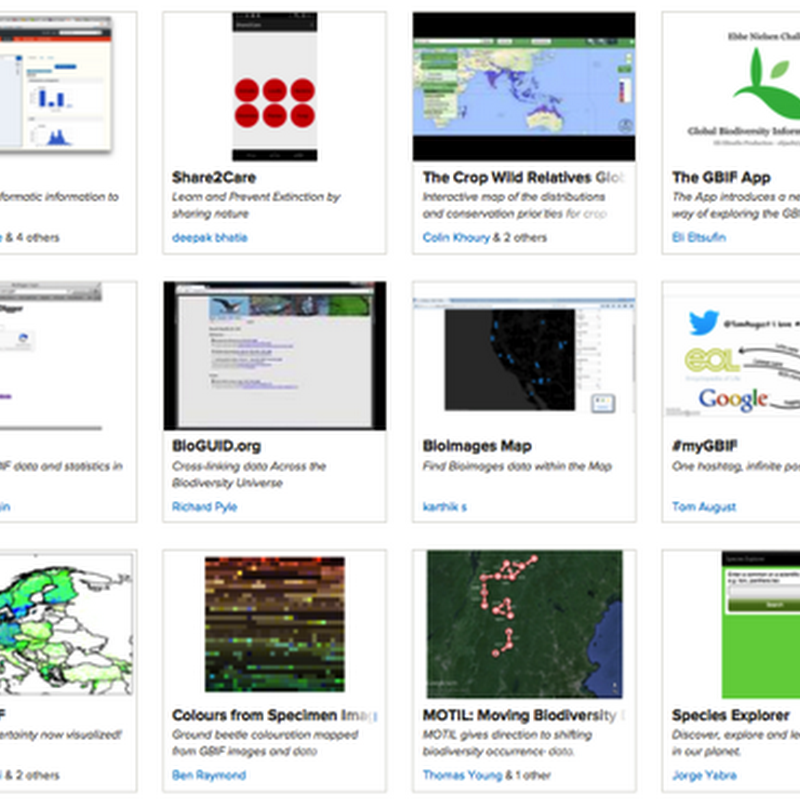I've submitted an entry for the 2018 GBIF Ebbe Nielsen Challenge. It's a couple of weeks before the deadline but I will be away then so have decided to submit early. My entry is Ozymandias - a biodiversity knowledge graph.
Messaggi di Rogue Scholar

First off, let me say that what follows is a lot of arm waving to try and obscure how little I understand what I'm talking about. I'm going to sketch out what I think is a "radical" idea for a GBIF Challenge entry. The motivation for this idea comes from several sources: 1. GBIF is (under-)funded by direct contributions from governments, hence each year it essentially "begs" for money.

Last year I finished my four-year stint as Chair of the GBIF Science Committee. During that time, partly as a result of my urging, GBIF launched an annual "GBIF Ebbe Nielsen Challenge", and I'm please that this year GBIF is continuing to run the challenge. In 2015 and 2016 the challenge received some great entries.

GBIF is running its Ebbe Nielsen Challenge for the third successive year. This year the title is Liberating species records from open data repositories for scientific discovery and reuse. To quote from the Challenge background on Devpost: In essence, the 2017 Challenge is to develop tools to discover these biodiversity-relevant datasets, and make them available to GBIF.

I’ve been on Twitter since April 2011 — nearly six years. A few weeks ago, for the first time, something I tweeted broke the thousand-retweets barrier. And I am really unhappy about it. For two reasons.

The GBIF 2016 Ebbe Nielsen Challenge has received 15 submissions. You can view them here: Unlike last year where the topic was completely open, for the second challenge we've narrowed the focus to "Analysing and addressing gaps and biases in primary biodiversity data". As with last year, judging is limited to the jury (of which I'm a member), however anyone interested in biodiversity informatics can browse the submissions.

In a classic paper Boggs (1949) appealed for an “atlas of ignorance”, an honest assessment of what we know we don’t know: This is the theme of this year's GBIF Challenge: Analysing and addressing gaps and biases in primary biodiversity data. "Gaps" can be gaps in geographic coverage, taxa group, or types of data. GBIF is looking for ways to access the nature of the gaps in the data it is aggregating from its network of contributors.
Steve Baskauf has concluded a thoughtful series of blog posts on RDF and biodiversity informatics with http://baskauf.blogspot.co.uk/2015/07/confessions-of-rdf-agnostic-part-7.html. In this post he discussed the "Rod Page Challenge", which was a series of grumpy posts I wrote (starting with this one) where I claimed RDF basically sucked, and to illustrate this I issued a challenge for people to do something interesting with some RDF I provided.

The six finalists for the GBIF Ebbe Nielsen Challenge have been announced by GBIF: The finalists all receive a €1,000 prize, and now have the possibility to refine their work and compete for the grand prize of €20,000 (€5000 for second place). As the rather cheesy quote above suggests, I think the challenge has been a success in terms of the interest generated, and the quality of the entrants.

The GBIF Ebbe Nielsen Challenge has closed and we have 23 submissions for the jury to evaluate. There's quite a range of project types (and media, including sound and physical objects), and it's going to be fascinating to evaluate all the entries (some of which are shown below). This is the first time GBIF has run this challenge, so it's gratifying to see so much creativity in response to the challenge.